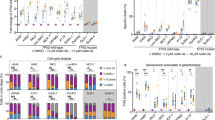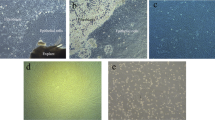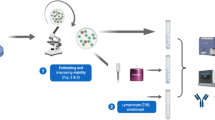Abstract
Flow cytometry is uniquely suited for distinguishing between isolated mammalian chromosomes differing in DNA content1,2 or DNA-base composition3,4. Using this technique, the 24 types of human chromosomes can be resolved into 15 groups when stained with Hoechst 33258 (refs 3, 5). When Hoechst 33258 (HO) and chromomycin A3 (CA3) are used, 20 groups of human chromosomes can be distinguished by dual-beam flow cytometry3,6, and the relative frequency of chromosomes in each group estimated. Flow measurements provide a precise description of the average chromosome complement of the cell population (a flow karyotype7) that is sensitive to chromosomal rearrangements2,8 and frequency changes; and also enable individual chromosomes to be purified, for example, for gene mapping9. Until now, chromosomes have been isolated for flow cytometry only from established fibroblast cultures. However, the maintenance of such cultures is time-consuming and expensive, and there is the risk that chromosomal rearrangements may occur during extended fibroblast culture. Here we describe two procedures for the isolation from short-term lymphocyte cultures of metaphase chromosomes that are morphologically intact, suitable for flow cytometric analysis and purification, and have DNA of high molecular weight.
This is a preview of subscription content, access via your institution
Access options
Subscribe to this journal
Receive 51 print issues and online access
$199.00 per year
only $3.90 per issue
Buy this article
- Purchase on Springer Link
- Instant access to full article PDF
Prices may be subject to local taxes which are calculated during checkout
Similar content being viewed by others
References
Gray, J. W. et al. Proc. natn. Acad. Sci. U.S.A. 72, 1231–1234 (1975).
Carrano, A. V., Van Dilla, M. A. & Gray, J. W. Flow Cytometry and Sorting, 421–451 (Wiley, New York, 1979).
Gray, J. W., Langlois, R. G., Carrano, A. V., Burkhart-Schultz, K. & Van Dilla, M. A. Chromosoma 73, 9–27 (1979).
Langlois, R. G., Carrano, A. V., Gray, J. W. & Van Dilla, M. A. Chromosoma 77, 229–251 (1980).
Carrano, A. V., Gray, J. W., Langlois, R. G., Burkhart-Schultz, K. & Van Dilla, M. A. Proc. natn. Acad. Sci. U.S.A. 76, 1382–1384 (1979).
Dean, P. N. & Pinkel, D. J. Histochem. Cytochem. 26, 622–627 (1978).
Gray, J. W. et al. Clin. Chem. 21, 1258–1262 (1975).
Carrano, A. V., Gray, J. W. & Van Dilla, M. A. Mutagen-Induced Chromosome Damage in Man, 326–338 (Edinburgh University Press, 1977).
Lebo, R. V. et al. Proc. natn. Acad. Sci. U.S.A. 76, 5804–5808 (1979).
Johnson, P. H. & Grossman, L. I. Biochemistry 16, 4217–4225 (1977).
Creusot, F. & Christman, J. K. Analyt. Biochem. 103, 343–349 (1980).
Butterworth, P. H. W. Subnuclear Components: Preparation and Fractionation, 295–323 (Butterworths, London, 1976).
Author information
Authors and Affiliations
Rights and permissions
About this article
Cite this article
Yu, LC., Aten, J., Gray, J. et al. Human chromosome isolation from short-term lymphocyte culture for flow cytometry. Nature 293, 154–155 (1981). https://doi.org/10.1038/293154a0
Received:
Accepted:
Issue Date:
DOI: https://doi.org/10.1038/293154a0
This article is cited by
-
Monoparametric models of flow cytometric karyotypes with spreadsheet software
Theoretical and Applied Genetics (1989)
-
Sorting of chromosomes by magnetic separation
Human Genetics (1988)
-
Stabilization of chromosomes by DNA intercalators for flow karyotyping and identification by banding of isolated chromosomes
Histochemistry (1987)
-
Human Chromosome–Specific DNA Libraries: Construction and Availability
Nature Biotechnology (1986)
-
Immunofluorescent detection of histone 2B on metaphase chromosomes using flow cytometry
Chromosoma (1984)
Comments
By submitting a comment you agree to abide by our Terms and Community Guidelines. If you find something abusive or that does not comply with our terms or guidelines please flag it as inappropriate.



